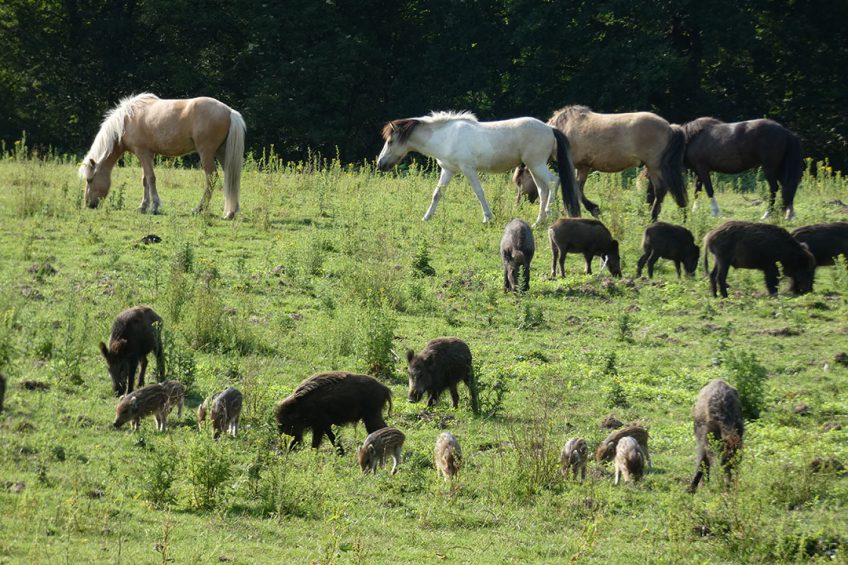ASF Germany: Number of wild boar cases tops Belgium

The number of African Swine Fever cases in wild boar in Germany has now officially exceeded those of Belgium: 835 cases. In this update also attention for Vietnam, that reopens for German pigmeat again and disgruntlement about how Germany is tackling the ASF outbreaks.
The count of infected wild boar is growing steadily in all districts in Eastern Germany where ASF has been found. On March 17, the vast majority had been found in 3 zones Brandenburg state, with 768 cases. In Saxony, another 67 carcasses tested positive for ASFv.
Belgium, which was officially declared free from ASF late 2020, suffered from infections in its wild boar herd in the southern province Luxembourg, as from September 2018. The last emaciated carcass that was tested positive was found early 2020. In total 833 wild boar got infected by the virus.
4 zones with ASF infections
It was to be expected that Germany would top Belgium’s amount. After all, Germany has identified 4 zones where the virus was found, and also neighbouring Poland is fighting the virus, which means that there is a constant threat of fresh introduction of the virus. This is why Germany is constructing a permanent fence parallel to the border rivers Oder and Neisse.
Another white zone completed
Recently a 2nd white zone was completely fenced off. White zones are 5km wide corridors around infected zones, in which hunters are supposed to depopulate the wild boar populations. This is to prevent that the virus can escape onto other animals from the infected inner zone.
The 2nd white zone was constructed in the districts Oder-Spree and Dahme-Spreewald, surrounding the infected zone that was most strongly infected. In total 136km of fence was constructed to fence off an area of 400 km2.
The 1st white zone was completed earlier; this one surrounded the infected zone that is located in the districts Oder-Spree and Spree-Neisse.
Saxony: ASF risk area expanded
A little bit more south, in Saxony state, the infected area has been expanded once more to measure three times the original size. The area that measured 322 km2 will be expanded to measure 989 km2 soon. The area will need expanding because of the number of infections, even though the cases are still in the current restricted area.
Vietnam allows German pigmeat again
Good news from Asia: Vietnam has decided to allow the imports of German pigmeat again. Just like various other countries outside the European Union, the Asian country had closed its borders for pork from Germany following the ASF outbreaks.
The German federal government tried to convince these so-called “third countries” to accept a regionalisation policy. This basically means that the presence of ASF in one state doesn’t mean the virus is all over the country.
Singapore also accepts regionalisation
The German federal ministry of agriculture also stated that Singapore accepted this regionalisation policy; in an earlier stage Bosnia-Herzegovina and Canada also have. In addition, Thailand chose not to extend the ban. With Brazil, Argentina, South Africa and South Korea certain exceptions have been arranged. These all, however, are all not major pork importing countries like Vietnam is.
In the context of ASF losses, Vietnam has been increasing its pork imports in recent years. In 2020, EU member states exported 95,000 tonnes of pig meat to Vietnam, of which almost 20,000 tonnes came from Germany. Talks with the largest pork importing country China are still ongoing.
The news was a positive stimulus for the German pig markets. Pig prices in Germany have recovered in recent weeks. Ever since the beginning of the year, the Vereinigungspreis, one of the major indices in Germany, had been at €1.19/kg slaughterweight. In a few weeks, this went up to €1.50/kg slaughterweight, an increase of €0.31.
Disgruntlement with ASF policy
Nevertheless, there is widespread unhappiness in Germany about the way the country is fighting ASF. Pig producers in Brandenburg state for instance are critical of the government’s actions. They criticise the slow build-up of the fences, as can be seen in the video below (in German) made by various agricultural organisations in Eastern Germany.
Amongst hunters in Brandenburg state, there is a strong feeling that control has been slipping away from the German authorities. From time to time infected carcasses are being found outside the infected zones, causing the Brandenburg state hunters’ association (LJVB) to speak of “an endemic spread.”
The association says the government is only chasing the current epidemic, failing to acknowledge that the pressure from Poland is high. In addition, the fencing system wouldn’t be wild boar proof. The LJVB demanded the resignation of the people involved and a realignment of the Brandenburg ASF crisis team.











